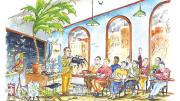1915
Undergraduate clubs pledge not to elect freshmen, in an effort to ensure that first-years adjust to Harvard social life by forming friendships in the dormitories. The Bulletin notes: “At most American colleges the ‘rushing’ of freshmen by rival fraternities is an evil clearly recognized and deplored. Harvard has never suffered from precisely this affliction.”
1925
The faculty, “whether out of consideration for the eyesight of the students or for the greater enlightenment of their minds,” delay the start of exams on January 24 from 9 a.m. to 10 so students may view the total eclipse of the sun.
1930
The nearly finished indoor athletic building contains a swimming pool financed by donors Aquaticus Anonymous and Alumnus Aquaticus, both later revealed to be Arthur W. Stevens ’97.
1935
President Conant proposes that the College drop its Latin requirement—even for those wishing to graduate with an A.B.
1945
The School of Public Health is running a special two-month course on parasitology, tropical medicine, sanitation, epidemiology, and related subjects for 60 naval medical officers who are scheduled for island rehabilitation duty in the Pacific.
1975
Radcliffe president Matina S. Horner joins the board of directors of Time Inc., saying she accepted the position only when she felt confident she was not being taken on merely as a token woman.
1985
After 67 years of loose affiliation with the College, all nine final clubs have chosen to return to completely independent status, rather than comply with official pressure to open their membership to women. The decision ends their access to Harvard’s phone system, low-cost steam heat, and mailing lists.









